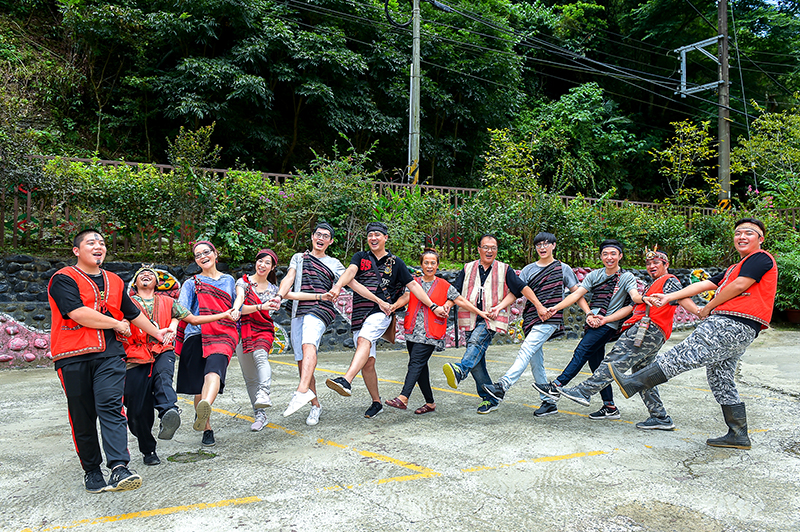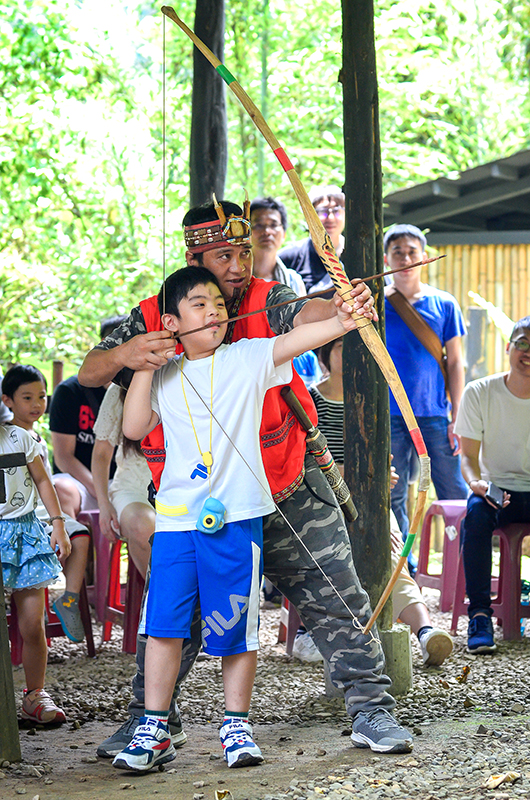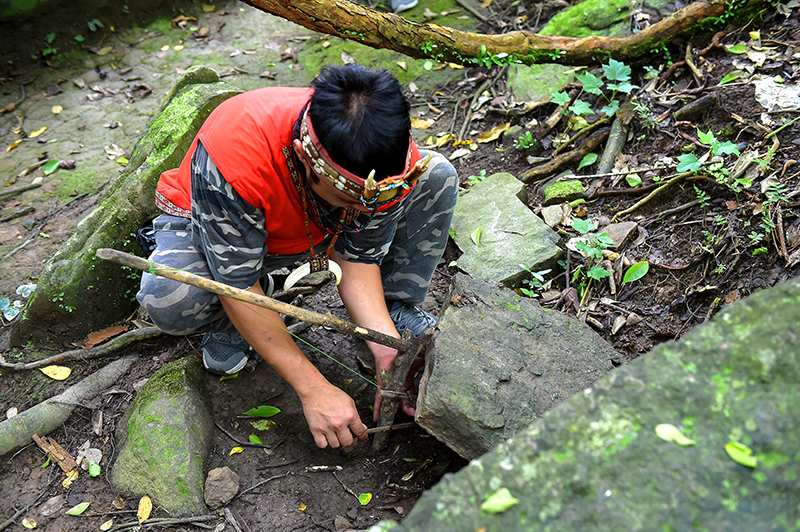The lush mountains of Wufeng Township in Hsinchu County are home to a hundred and so Atayal people living in Maybalay Community. Every year this community attracts over six thousand visitors who come to try on traditional Atayal shawls, paint their faces with Atayal tattoos, learn how to use a bow and arrow, and sing and dance with community members. They can also follow the locals on a hunting trip and learn the wisdom of laying animal traps; and when it is time to eat, everyone sits around the fire to roast meat skewers. This is the Atayal experience tour offered by Wufon Hunter School, where visitors experience the Atayal lifestyle for an entire day.
The founder of Wufon Hunter School is Guo Wen-biao, husband to an Atayal wife. He actually went from having zero knowledge of indigenous community culture to setting up the Hunter School. "Maybe the ancestral spirits want me to come back!" Guo said with a smile. "Some say this is my destiny, but I think it's my mission."

Wufon Hunter School tour instructors dance happily with visitors.
Launching Culture and History Research
to Revitalize Atayal Culture
Originally from a Hakka community in Zhubei City, Guo Wen-biao's relationship with the Atayal community began through his wife. Before he retired from his post in the public sector, Guo was already an active member in Atayal communities. He participated in many community affairs with his wife, sometimes even pitched in to help revive communities. He not only took part in activities such as preserving mountain lands, planting trees, and managing community operations, but also set up the Maybalay Culture & Recreation Eco-preservation Industry Association and the Bamboo Forest Health Cooperative (竹林養生合作社) with local bamboo industries.
Eight years ago when Guo retired, the couple decided to move back to the community. At that time, Guo was serving as the Director of Maybalay Community Agri-tourism Area. The community, under his management, received a Grade A certification among over 80 agri-tourism areas in Taiwan, yet the overall economic situation of the village did not improve, even after various attempts over the years.
"Later I realized it was because I was using the wrong methods. I was thinking from a Han perspective and thought that with money and resources, the community would thrive. But the key is to go back to our cultural roots." Thus in 2013, they began the Wufon Hunter School project. With Atayal culture as its foundation, the school aims to preserve the gradually disappearing traditional culture, and promote and develop indigenous community tourism.
The preparation process alone took two years. The main reason is because the Atayal people’s history is passed on orally, and without written words, it is difficult to compile a complete history of the community. In order to carry on the flaming torch of local culture, the couple began their extensive research: they interviewed community elders and collected data, and combined traditional Atayal culture elements such as songs and ancient chants, dance, weaving, hunting, farming, and food and drink into tour itineraries. "The core concept of the school is to reintroduce Atayal culture. Throughout the entire day, every experience the visitors encounter is part of our strategic marketing of community culture." joked Guo Wen-biao.
The school opened in 2015, yet the documentation and research of local culture and history did not stop there. During this year's Millet Harvest Ritual, Guo Wen-biao studied the ritual of offering thanks to the ancestral spirits, and tried to figure out a sustainable agriculture operation model for Maybalay Community through traditional millet farming methods. "I'm racing against the clock now. I fear the elders will leave us before we can document all of this and the culture will disappear with them." In addition to interviewing elders, the couple also reconstructed old communities by restoring traditional family houses, barns, and lookout towers. "This is a culture restoration base for future children to experience how their ancestors lived in the community."


At Wufon Hunter School, tour instructors teach visitors how to hunt with a bow and arrow. Visitors can experience Atayal lifestyle and culture here.
Being Proud of Local Culture
and Restoring Community Confidence
Many community members were able to return to and work in the community after Wufon Hunter School was established. Currently the school has seven full-time employees, among which three are tour instructors, and the youngest is only 18 years old. "A lot of indigenous people have lost their confidence because they cannot find their roots and eventually give up on themselves." Guo Wen-biao realized the solution to this problem is the Hunter School. After completing tour instructor training, community members can introduce their own culture to visitors with pride. "They are doing something they are proud of, and we are also training the next generation of local talents."
Guo Jun-ling, Guo Wen-biao's son, also returned to the community two years ago. Thirty-year-old Jun-ling is responsible for digital marketing and promotion. He runs the official website and FB fanpage, and shoots Vlog videos to connect the traditional community with the younger generation. After working here for a couple of years, Jun-ling observed a change in local attitude. "In the past, the community members were overall quite passive. Someone had to come out and take the lead, and people would wait for a demonstration and actual results. Now we are gradually getting on the same page and we all want to make the community a better place."
In order to effectively promote indigenous community culture to a wider public, Guo Wen-biao planned out detailed job responsibility charts and procedures so that the school can handle up to 120 visitors at the same time without any difficulties. Furthermore, this year Wufon Hunter School launched the new Yamay "Born from Stone" Community Tour. Legend has it that the ancestors of Atayal people were born from stone, and “Yamay” is the word for “stone” in the Atayal language. The tour explains how the villagers lived in caves and tells the story of the strangely shaped large rock. The itinerary also includes a Food Forest Party which involves gathering and hunting. "Every community has their own culture,” explained Guo Wen-biao, “the key is to find your own unique DNA and transform it into a story which can fully present the culture of your village."
"Traditions are our roots, and the land is our life. Sustainability is our hope, and diversity is our wealth. And culture is the promise of livelihood for our next generation." This is the wisdom of life Guo Wen-biao learnt from the elders. On this piece of land left by their ancestors, Wufon Hunter School leverages local culture as a foundation to let community value shine once again.




